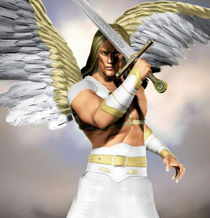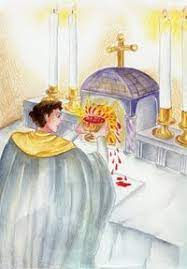The Catholic Defender: St. Martin I, Last of the Early Popes venerated as a Martyr
- Donald Hartley

- Apr 13, 2022
- 4 min read

649 A.D. was a time of great turmoil in the world. The Arab-Byzantine war was in full swing as the Arab Naval forces conquered Cyprus as Abdullah ibn Saad sought to exert the Moslem world in the Middle East. The governor of Syria, Muawiyah ibn Abi Sufyan mobilizes a navy that challenges the Byzantine Empire in the Aegean Sea with Christian slaves. The spread of Islam was in full force beginning the threatening of the Christian World. The Persian hordes destroyed the Holy Shrines where they took power.
On May 14 649, Pope Theodore I (the 72 successor of St. Peter) dies who was known to have been a true Shephard for the Catholic Faith caring for the poor and destitute. On July 5, 649 A.D., St. Martin I was elected as the 73rd successor of St. Peter who had to deal with a terrible heresy call Monothelitism that maintained Jesus Christ had but one will. This was a problem primarily from the Eastern lung of the Church. The Lateran Council (649) was called originally by Pope Theodore which St. Martin I convened the Council beginning on October 5 to condemn this heresy. The Council of Constantinople (the sixth ecumenical council 680-681) condemned Monothelitism.

Another problem that developed with St. Martin's elevation to the Papacy was that Constans II (Constantine the Bearded), the Byzantine Emperor from 641-668, was not submitted to the emperor for his approval. Constans was a devout Monotheist who ordered the "Exarchate of Ravenna" Olympius to arrest Pope Martin I. Pope Martin censured Constans II "imperial documents" that favored Monothelitsm, that sought to turn the people and their bishops against the Pope. With a complete failure in this attempt, Constans II then attempted to assassinate the Pope who condemned the Patriarch of Constantinople and his two predecessors.
Constans sent troops to Rome to capture Pope Martin to bring him to Constantinople. On 17 June 653, at this time the Pope was in poor health and offered no resistance to Calliopas (successor to Olympius who had died), the Exarch of Constantinople placed the Pope in exile in Constantinople. Pope Martin arrived in Constantinople on 17 September 653 after first taken to Naxos Greece where he suffered from maltreatment by his captors. Pope Martin was placed in prison where he endured terrible tortures and hardships. He suffered from dysentery being held forty-seven days without being allowed to wash himself. Being stripped of his vestments, they dragged the Pope in shackles through the streets of Constantinople with horrible flogging resembling Christ's scourging at the pillar.
After being deported to Crimea (Cherson) 15 May 655, Pope Martin, the man of God, dies as a result of the hardships he endured on 16 September 655. Pope Martins greatest anguish he suffered was he lived long enough to see a successor chosen on 10 August 654 (Eugene I) who incidentally took the side of Pope St. Martin I on the question of Monothelitism. The Muslims defeated Constans in the naval battle of Phoenix in 655 that saved the Pope from suffering his predecessor's fate.
Along with Pope Martin was a Monk, Maximus, who opposed the heresy of monothelitism suffered being tried for treason. Maximus was tortured to death by flaying his skin and burning him causing great pain. Today, they are part of that Great Cloud of Witnesses in Heaven that prays for us to run the race as St. Paul had done so long ago.

Through St. Martin's faithfulness to serve Jesus Christ as the Shephard of the Sheep, the truth of the Nature of Jesus having "two Will" was preserved and maintained in the Catholic Faith. The Council of Constantinople (the sixth ecumenical council 680-681) condemned Monothelitism.
The Church at Chalcedon, 451, ruled that Jesus was one person uniting in himself two full and complete natures – a complete divine nature and a complete human nature. So that he was fully human and fully divine; wasn’t half human, half divine. He’s fully human and fully divine. Jesus has a fully divine Will and a fully human will. Pope St. Martin's Feast day is 13 April.
Pope Pius VII made an honorable reference to Martin in his 1800 encyclical Diu satis:
"Indeed, the famous Martin who long ago won great praise for this See, commends faithfulness and fortitude to us by his strengthening and defense of the truth and by the endurance of labors and pains. He was driven from his See and from the City, stripped of his rule, his rank, and his entire fortune. As soon as he arrived in any peaceful place, he was forced to move. Despite his advanced age and an illness which prevented his walking, he was banished to a remote land and repeatedly threatened with an even more painful exile. Without the assistance offered by the pious generosity of individuals, he would not have had food for himself and his few attendants. Although he was tempted daily in his weakened and lonely state, he never surrended his integrity. No deceit could trick, no fear perturb, no promises conquer, no difficulties of dangers break him. His enemies could extract from him no sign which would not prove to all that Peter "until this time and forever lives in his successors and exercises judgment as a particularly clear in every age" as an excellent writer at the Council of Ephesus says."





















Comments